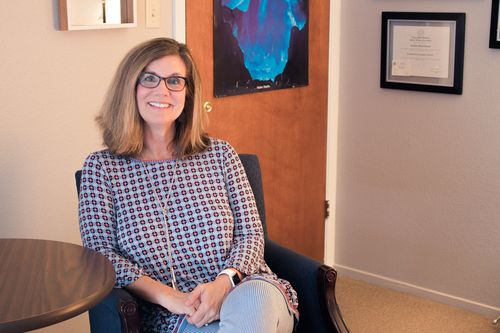My Favorite Things: COVID-19 and Taking Care of Your Marriage

Carolyn Dixon, MSW, LCSW shares her favorite sayings and counseling interventions to help you live a more abundant life in her series entitled, “My Favorite Things.” Read on to learn about what you can do to keep your marriage healthy in the midst of COVID-19 stress and too much time at home with your spouse!
Our world has turned upside down. So many things have changed in a short amount of time. I can only imagine all that you are concerned about: toilet paper, health issues, life and death, financial ramifications for you and our country… The list of stressors could go on. In the midst of these challenges, I pray that you are able to find a support system in your life, in your relationship with God, with family and friends, and with community. In particular, for you married folks, I hope that you can find support in a connected relationship with your spouse!
If you’re having challenges connecting to your spouse right now, though, you’re not alone. COVID-19 will affect every couple and family in different ways, but for all of us it has certainly led to changes and unexpected transitions. With these changes comes stress, fear at the uncertainty of it all, and probably a lot more time together. Right now, your house might feel a little like a pressure cooker!
In China, quarantine conditions have led many couples to file for a divorce. Yi Xiaoyan is the registration center’s director in Milou, a city in the province of Hunan. He explains the spike in this way: “Trivial matters in life led to the escalation of conflicts, and poor communication has caused everyone to be disappointed in marriage and make the decision to divorce.” Soberingly, domestic violence reports have also gone up. (1) It seems that being together for an extended amount of time may have brought out the worst in couples as little disagreements have increased tensions.
So how can we take care of our marriages in these high-stress days and get ahead of the “divorce curve”? How can we stay connected to our spouses and find support rather than animosity? As I shared in my last My Favorite Things post, conflicts are going to happen, that’s for sure. What matters is how we repair after conflict. And repairing begins with understanding what happens in our hearts and in our actions when conflict arises.
If you’re having challenges connecting to your spouse right now, though, you’re not alone. COVID-19 will affect every couple and family in different ways, but for all of us it has certainly led to changes and unexpected transitions. With these changes comes stress, fear at the uncertainty of it all, and probably a lot more time together. Right now, your house might feel a little like a pressure cooker!
In China, quarantine conditions have led many couples to file for a divorce. Yi Xiaoyan is the registration center’s director in Milou, a city in the province of Hunan. He explains the spike in this way: “Trivial matters in life led to the escalation of conflicts, and poor communication has caused everyone to be disappointed in marriage and make the decision to divorce.” Soberingly, domestic violence reports have also gone up. (1) It seems that being together for an extended amount of time may have brought out the worst in couples as little disagreements have increased tensions.
So how can we take care of our marriages in these high-stress days and get ahead of the “divorce curve”? How can we stay connected to our spouses and find support rather than animosity? As I shared in my last My Favorite Things post, conflicts are going to happen, that’s for sure. What matters is how we repair after conflict. And repairing begins with understanding what happens in our hearts and in our actions when conflict arises.
Fighting for the Relationship: Pursue/Withdraw Cycle
Statistically, 80% of all couples have a “pursue/withdraw” cycle. This means that no matter what the argument is about (household chores, disciplining children, money, too much screen time), the pattern remains the same. One partner is a “pursuer.” The pursuer does the best he or she can to save the relationship by “pursuing,” and this may come out in a mean, attacking, critical way. The other partner is the “withdrawer.” The withdrawer does the best he or she can to save the relationship by pulling away, which could look like leaving the room, not saying anything, or getting busy or distracted. In Emotionally Focused Therapy, which applies attachment theory to adult bonding, we assume that both the pursuer and the withdrawer want the relationship to work, so therefore it is true that in conflict, your partner is doing the best he or she can to save the relationship.
What role do you play in your relationship? Are you the “Pursuer”? In adult attachment terms, this style is an anxious attachment style. I am a pursuer, which means that when something is bothering me, I want to bring it up and get it resolved. Typically, my tone and body language isn’t very inviting and I come across to Donnie (my husband of 36 years) as critical, negative, blaming, and attacking. Underneath the angry exterior, I am usually feeling sadness and fear, afraid that I am all alone and have to take care of things by myself.
Are you the “Withdrawer”? In adult attachment terms, this style is an avoidant attachment style. Donnie sees my intensity (which I don’t see as intense) and decides the best course of action is to try and calm down the situation. He does this by acting defensively, minimizing the situation, and then shutting me down by changing the subject or leaving to do something else. Underneath that behavior is usually shame and a fear of rejection; he worries that he is never good enough.
Can you see how this works? Donnie and I have created a pattern that we fall into, no matter what the argument is about (caveat - sex might have a different cycle). In my last post, for instance, I talk about a fight we had over toothpaste. Yes, toothpaste! So if you find yourself trying to communicate with your partner and watching things go sideways, know that you’re not alone. The “little things” get to us because they’re tapping into core fears and hurts underneath.
Statistically, 80% of all couples have a “pursue/withdraw” cycle. This means that no matter what the argument is about (household chores, disciplining children, money, too much screen time), the pattern remains the same. One partner is a “pursuer.” The pursuer does the best he or she can to save the relationship by “pursuing,” and this may come out in a mean, attacking, critical way. The other partner is the “withdrawer.” The withdrawer does the best he or she can to save the relationship by pulling away, which could look like leaving the room, not saying anything, or getting busy or distracted. In Emotionally Focused Therapy, which applies attachment theory to adult bonding, we assume that both the pursuer and the withdrawer want the relationship to work, so therefore it is true that in conflict, your partner is doing the best he or she can to save the relationship.
What role do you play in your relationship? Are you the “Pursuer”? In adult attachment terms, this style is an anxious attachment style. I am a pursuer, which means that when something is bothering me, I want to bring it up and get it resolved. Typically, my tone and body language isn’t very inviting and I come across to Donnie (my husband of 36 years) as critical, negative, blaming, and attacking. Underneath the angry exterior, I am usually feeling sadness and fear, afraid that I am all alone and have to take care of things by myself.
Are you the “Withdrawer”? In adult attachment terms, this style is an avoidant attachment style. Donnie sees my intensity (which I don’t see as intense) and decides the best course of action is to try and calm down the situation. He does this by acting defensively, minimizing the situation, and then shutting me down by changing the subject or leaving to do something else. Underneath that behavior is usually shame and a fear of rejection; he worries that he is never good enough.
Can you see how this works? Donnie and I have created a pattern that we fall into, no matter what the argument is about (caveat - sex might have a different cycle). In my last post, for instance, I talk about a fight we had over toothpaste. Yes, toothpaste! So if you find yourself trying to communicate with your partner and watching things go sideways, know that you’re not alone. The “little things” get to us because they’re tapping into core fears and hurts underneath.
What Does Your Cycle Look Like?
Wherever you and your spouse find yourselves--connected, disconnected, and everywhere in between--you can take some time to chart your particular cycle. Even though there is commonality in the Pursue/Withdraw pattern, the feelings and behaviors will look a little different for each couple. Here’s what you can do right now to move towards more connection in your relationship:
The more you can understand the cycle that happens between you and your partner, the better you will be able to repair as inevitable quarantine conflicts come up.
Take care,
Carolyn
(1) https://www.bloomberg.com/news/articles/2020-03-31/divorces-spike-in-china-after-coronavirus-quarantines
Wherever you and your spouse find yourselves--connected, disconnected, and everywhere in between--you can take some time to chart your particular cycle. Even though there is commonality in the Pursue/Withdraw pattern, the feelings and behaviors will look a little different for each couple. Here’s what you can do right now to move towards more connection in your relationship:
2. Identify who is the Pursuer and who is the Withdrawer.
3. Try to reflect on a past disagreement. What do you tend to do? What might be going on in your internal world underneath the behavior; what thoughts and feelings do you tend to have?
4. If you can talk to your spouse, that’s great! Have a conversation about what came up for you and what you noticed during this activity.
5. If you can’t talk to your spouse, try this instead:
a. Get out a journal and write out the thoughts and feelings that came up for you while doing this activity.
b. Write out 5 things you are grateful for, and make at least 2 of them about your spouse.
The more you can understand the cycle that happens between you and your partner, the better you will be able to repair as inevitable quarantine conflicts come up.
Take care,
Carolyn
(1) https://www.bloomberg.com/news/articles/2020-03-31/divorces-spike-in-china-after-coronavirus-quarantines

Carolyn Dixon has been with ALCS since 2004 and counsels clients from our North Austin location. She is trained to counsel individuals, couples, and families with a range of issues including anxiety, loneliness, anger, grief and loss, parenting and family challenges, premarital and marital issues, and divorce recovery. Carolyn has a passion for strengthening marriages and is certified in Emotionally Focused Therapy (EFT), an intervention that is based on scientific study of adult love and bonding processes in couples. For more information about Carolyn's practice or to set up an appointment with Carolyn, call us today!
Further Resources:
Love Sense: The Revolutionary New Science of Romantic Relationships, by Sue Johnson
Created for Connection: The "Hold Me Tight" Guide for Christian Couples, by Sue Johnson with Kenneth Sanderfer
Love Sense: The Revolutionary New Science of Romantic Relationships, by Sue Johnson
Created for Connection: The "Hold Me Tight" Guide for Christian Couples, by Sue Johnson with Kenneth Sanderfer
Posted in Blogs by Carolyn, COVID-19, Marriage, My Favorite Things
Posted in Christian counseling, Christian therapy, communication, connection, counseling, crisis, EFT, Intimacy, My Favorite Things, relationships, therapy
Posted in Christian counseling, Christian therapy, communication, connection, counseling, crisis, EFT, Intimacy, My Favorite Things, relationships, therapy
